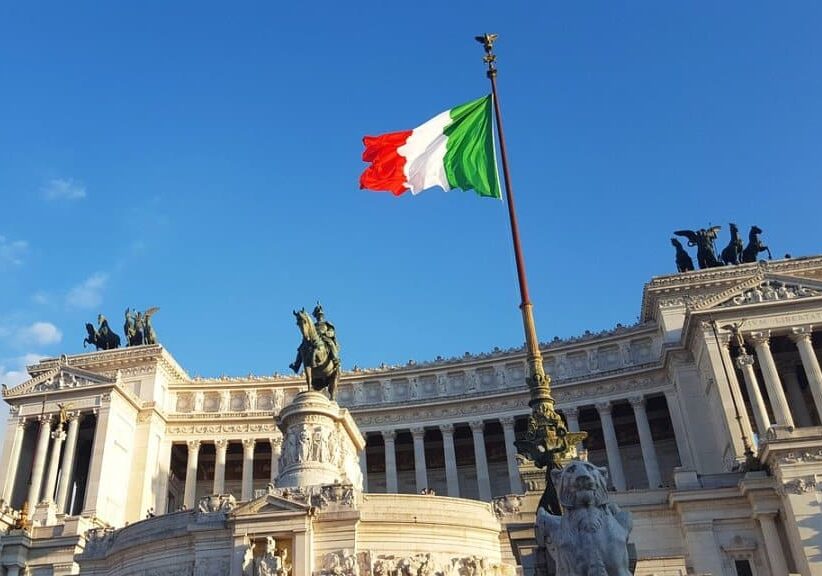
Buyers have a wide variety of homes to choose from, including vacation homes in the countryside, apartments in the historic part of town, and lovely seaside homes that help you escape the noise of city life.
This guide will help you navigate buying a property in Italy. It will explain in detail the current state of the Italian real estate market, the types of homes available, the costs of property purchase, and more.
This is what we will cover:
- Why Consider Buying Property in Italy?
- Can foreigners buy property in Italy?
- What’s the Real Estate Market Like in Italy?
- Best Places to Purchase Property in Italy
- Types of Property in Italy
- Documents Needed When Buying Property in Italy
- Step-by-Step Process on Purchasing Property in Italy
- Cost of Buying Property in Italy
- Property Taxes in Italy
Why Consider Buying Property in Italy?
One of the most common reasons why North Americans, UK citizens, and other foreign nationals start considering purchasing property in Italy and moving there is the country’s scenic landscapes and outstanding balance between a laid-back and hard-working lifestyle. Here are the main reasons why you should consider property purchase in Italy:
1. Favorable taxation for foreign buyers
Italy offers several tax incentives that appeal to foreign buyers. New residents can opt for the Italy flat tax of €200,000 per year on all foreign income, no matter the amount. Retirees moving to certain southern regions may qualify for a 7% flat tax on foreign pensions and income for up to 10 years. If you buy a primary residence and become a resident, you can benefit from lower registration taxes and exemptions from some local property taxes like IMU.
2. Strong rental income potential
Italy’s popularity with tourists has gained it a healthy rental market, especially in cities like Rome, Florence, and Venice, as well as coastal regions like Sicily and the Amalfi Coast. Vacation rentals can generate high seasonal income, while university towns such as Bologna or Pisa can provide steady long-term rental demand. Non-residents can rent their properties legally, though income must be reported and taxed. Depending on location and property type, rental yields range from 4% to 8% annually.
3. Low cost of living in many regions
Outside bigger cities, Italy is surprisingly affordable. Southern regions like Calabria, Abruzzo, and Le Marche offer both low property prices and daily living costs. A couple can live well in smaller towns for €1,200–€1,800 per month, which covers housing, food, and utilities. The public healthcare system is efficient and low-cost, and fresh, local food is easily found. This makes Italy ideal for retirees or remote workers looking for comfort without high expenses.
4. Breathtaking scenery and lifestyle
Italy is loved for its beauty, from the Alps to the Mediterranean beaches and Tuscan countryside, the views are consistently stunning. Towns are rich in culture and architecture, and daily life revolves around food, family, and social connection. The country is perfect for anyone looking to enjoy city life or rural charm.
5. Affordable property prices
Property in Italy is still relatively cheap compared to much of Western Europe. In smaller towns or rural areas, prices often range from €600 to €1,500 per square meter. Some villages even offer homes for €1, usually with renovation commitments. Even in more popular regions, you can find good value in countryside homes, apartments, and historical buildings. Italy is a cost-effective option for buyers seeking long-term value or a second home.
6. Golden Visa and residency options
While buying property doesn’t grant citizenship, it can support your visa or residency application. The Elective Residency Visa suits retirees or financially independent individuals who purchase a home and show enough income to live in Italy. The Investor Visa, or the Italian Golden Visa, requires €250,000 in a startup or €500,000 in a company. It is another path for those investing in the country, and owning property strengthens your connection to Italy and makes long-term residence more feasible.
Can foreigners buy property in Italy?
Yes, foreigners can buy property in Italy. EU and EEA citizens face no restrictions, while non-EU citizens can purchase property if their country has a reciprocity agreement with Italy. This includes countries like the United States, Canada, the United Kingdom, and Australia. You do not need to live in Italy to own property, but you must obtain a Codice Fiscale, an Italian tax identification number, and complete the sale through a notary. Property contracts are usually written in Italian. Foreign buyers are also allowed to rent out their property, and owning a home can support visa applications, such as the Italy Elective Residency Visa.
What’s the Real Estate Market Like in Italy?

New home prices in Italy rose by 9.35 percent in the last quarter of 2024, while existing home prices increased by 3.43 percent. Rent prices are also climbing, with the average in April 2025 reaching 13.97 euros per square meter per month, up 7.38 percent from the previous year.
Prices vary across the country. Northern regions like Tuscany, Lombardy, and Veneto are more expensive and attract buyers looking for luxury homes or city properties. Southern areas such as Calabria, Puglia, and Sicily offer cheaper options, ideal for budget-friendly purchases or investments. Large cities like Rome, Milan, and Naples are more costly due to high demand.
Best Places to Purchase Property in Italy
Italy has many great places to buy property, from busy cities to quiet coastal towns and countryside villages. The locations below stand out for their affordable prices, good rental potential, and nice lifestyle. Whether you want a vacation home, an investment, or a permanent place, these spots offer good options. Italy also has many other beautiful areas to consider, with different benefits.
Bari
Bari is a city on the Adriatic coast in southern Italy and the capital of the Puglia region. It is growing in both business and tourism. Homes in Bari are quite affordable, with average prices around €1,700 per square meter. In areas near the sea, like Palese or Torre a Mare, prices are a bit higher but still cheaper than in northern cities. Bari is a good choice for people who want to live near the beach or invest in rental property.
Trieste
This northeastern city near the Slovenian border is known for its mix of Italian, Austrian, and Slavic influences. Trieste offers a blend of culture and sea views, with average property prices around €2,300 per square meter. The elegant old town and waterfront areas are especially appealing. The city has a slower pace compared to Rome or Milan but remains well-connected and affordable.
Catania
Catania is a lively city on the east coast of Sicily, known for its Baroque buildings and views of Mount Etna. The average price for a home is about €1,200 per square meter, and some places in the city center cost even less. With its warm weather, low living costs, and more tourists visiting Sicily, Catania is a great place to buy a holiday home or a rental property.
Turin
Turin is a northern Italian city known for its beautiful old buildings and strong economy. Homes cost about €2,500 per square meter, with higher prices in areas like Crocetta and the historic center. It’s close to the Alps, has great public transport, and attracts both locals and foreigners looking for stable investments.
Ascoli Piceno
Ascoli Piceno is a quiet town in the Marche region with medieval streets, Roman bridges, and a lovely central square. Property here is affordable, with prices around €1,300 per square meter. Its location between the mountains and the sea makes it a great choice for people who want a peaceful and scenic place to live.
City/Area | Price per m² | Estimated Rental Yield (%) | Notes |
Bari (Puglia) | €1,700 | 4.5% – 6.5% | Coastal city with growing tourism and affordable prices |
Trieste (Friuli-Venezia Giulia) | €2,300 | 4% – 5.5% | Elegant seafront city, good infrastructure |
Catania (Sicily) | €1,200 | 5% – 7% | Low cost, rising tourist interest |
Turin (Piedmont) | €2,500 | 4% – 5% | Cultural city, strong rental demand |
Ascoli Piceno (Marche) | €1,300 | 3.5% – 5% | Historic and affordable with niche tourist appeal |
Types of Property in Italy
Italian citizens and foreign investors looking to buy property in Italy can access different property types. These are some of the most common types of homes house hunters will encounter.
Type of Home | Description |
Casa Indipendente (Single-Family Home) | A detached house was built for one family, separate on all sides. |
Appartamento (Apartment or Flat) | Individual units in a shared building with common areas, similar to condos. |
Villetta / Casa a Schiera (Townhouse) | Homes are attached side-by-side, sharing walls with neighbors. |
Villa | Large, standalone homes often with big gardens, found in elegant or rural areas. |
Terra-tetto | Usually a 2-3 floor single-family home, can be detached or connected to neighbors. |
Rustico / Casale (Country House/Farmhouse) | Traditional rural homes are often older and may need renovation. |
Masseria | Large farmhouses or estates are common in southern Italy, especially in Puglia. |
Palazzo | Grand historic buildings are often divided into apartments, standard in cities like Rome or Florence. |
Casa Bifamiliare (Two-Family House) | The detached house is divided into two separate living units. |
Monolocale (Studio Apartment) | One-room apartments combine living, sleeping, and kitchen in a single space. |
Bilocale (One-Bedroom Apartment) | Apartments with a separate bedroom and living area. |
Trilocale (Two-Bedroom Apartment) | Apartments with two bedrooms and a living room. |
Documents Needed When Buying Property in Italy
Buyers need to provide proof of identity, financial means, and a tax code. A notary will handle most legal checks and work with government offices like the Agenzia delle Entrate for tax registration and the Land Registry (Catasto) to verify property records and ownership.
Here is a list of the main documents required for the process.
Documents you need as a buyer
- Passport or National ID – To confirm your identity.
- Codice Fiscale – Your Italian tax code, required for all legal documents.
- Proof of Funds – Bank statements or documents showing you can afford the property.
- Italian Bank Account Details – For transferring the purchase amount and handling local payments.
- Preliminary Sales Agreement – If you’ve already signed an offer or reservation contract.
- Residency Permit – Only needed if you’re a non-EU citizen planning to live in Italy long term.
Documents handled or verified by the notary
- Land Registry Extract (Visura Catastale) – Confirms property ownership and legal status.
- Cadastral Plan (Planimetria Catastale) – Shows the property layout and measurements.
- Energy Performance Certificate (APE) – Rates the energy efficiency of the property.
- Title Deed (Atto di Provenienza) – Verifies how the current owner acquired the property.
Step-by-Step Process on Purchasing Property in Italy
Buying property in Italy can be a bit more complex than in other countries, but if you get agents and a mortgage broker, you should have your Italian home in no time.
Here’s a breakdown of the key steps of property purchase in Italy:
- Hire a real estate agent: A local agent can help you find properties, negotiate, and guide you through the process. They understand the market and local rules.
- Get a codice fiscale (Tax Code): This is your Italian tax identification number, required for any legal transaction. You can get it from the Italian Revenue Agency or an Italian consulate.
- Open an Italian bank account: You’ll need a local account to pay for the property and handle taxes, utilities, or rental income.
- Make an offer: Once you choose a property, you make a formal offer. If accepted, you sign a reservation agreement (Proposta di Acquisto), often with a small deposit.
- Sign the preliminary contract (Compromesso): This outlines the sale terms and includes a deposit (typically 10–30%). If you back out, you lose the deposit. If the seller backs out, they pay double.
- Due diligence and legal checks: Before the final sale, a notary (notaio), a neutral public official, performs checks to confirm that the seller is the legal owner, there are no debts or legal issues, and the property complies with local building and zoning rules. Some buyers also hire a private lawyer for extra protection, especially if buying from abroad.
- Sign the final deed (Rogito) with a Notary: The final contract is signed in front of the notary, who oversees the transaction, handles the registration, and ensures everything is legal. At this stage, the remaining balance is paid, and the buyer becomes the official owner.
- Register the property and pay the taxes: The notary registers the deed with the Land Registry. The buyer pays: Registration tax (2–9% depending on the property, notary fees, and agency commission if applicable.
Cost of Buying Property in Italy
When buying a house in Italy, it is important to understand both the upfront costs and the ongoing expenses that come with property ownership. The tables below outline the immediate costs you will face during the purchase process such as notary fees, taxes, and deposits, as well as the recurring costs like utilities, insurance, and maintenance. Being aware of these expenses can help you budget more accurately and avoid surprises as a foreign buyer.
Immediate costs when buying a house in Italy
Cost Type | Description | Typical Amount |
Deposit (Caparra) | Initial amount paid when signing the preliminary contract (Compromesso) | Usually 10% to 20% of the purchase price |
Notary Fees | For drafting and registering the deed of sale | 1% to 2.5% of the purchase price or €2,000–€5,000 |
Registration Tax / VAT | Tax on the property transfer (based on property type and buyer status) | 2% to 9% (resale), or 4% to 22% (new builds) |
Real Estate Agent Fees | Commission for buyer’s agent (if used) | 2% to 3% of the purchase price + 22% VAT |
Legal/Translation Fees | Optional, for legal review and translated documents | €1,000 to €3,000 depending on services used |
Mortgage Fees (if applicable) | Includes application, appraisal, and processing costs | 1% to 2% of the loan amount + extra bank fees |
Technical Survey (optional) | Home inspection for structural and legal checks | €300 to €1,000 depending on property size |
Ongoing costs of owning property in Italy
Cost Type | Description | Typical Amount |
Utilities (Water, Gas, Electricity) | Monthly bills for basic services | €100 to €300 per month, depending on usage |
Condominium Fees | Shared building maintenance and services | €50 to €200 per month for apartments |
Property Insurance | Home insurance against fire, theft, etc. | €150 to €400 per year |
Maintenance and Repairs | Regular upkeep like plumbing, painting, garden | Varies widely; plan for at least 1-2% of property value yearly |
Garbage Collection Fees | Often included in TARI tax but sometimes extra | €100 to €300 annually |
Property Taxes in Italy
If you want to buy a home in Italy, it’s crucial to know about the taxes you may need to pay. The table below shows the main property taxes in Italy. These costs can vary depending on where the home is and if it’s your main or second home.
Tax Type | Description | Typical Rate / Amount |
IMU (Imposta Municipale Unica) | Municipal property tax, mainly for second homes and luxury properties | Around 0.4% to 0.76% of cadastral value (varies by municipality) |
TASI (Tax on Indivisible Services) | Covers local services like street lighting, cleaning | Usually 0.1% to 0.25% of cadastral value |
TARI (Waste Tax) | Tax for waste collection services | Varies depending on property size and location |
Capital Gains Tax | Tax on profit if you sell the property within 5 years | 20% on profit, but exemptions may apply |
How Can Global Citizen Solutions Help You?
Global Citizen Solutions is a boutique investment migration consultancy firm focused on finding the right residency or citizenship by investment program for individuals wishing to secure their future and become global citizens. With offices in Portugal, the United Kingdom, Hong Kong, and Brazil, our multilingual team guides individuals and families from start to finish, providing expert advice considering freedom, mobility, taxation, and security.
- We have helped hundreds of clients from 35+ countries in all the top residency by investment and citizenship by investment programs. With an in-depth and comprehensive understanding of the area, we provide our clients with solid guidance.
- Our team has never had a case rejected. Our 100 percent approval rate sets us apart from our competitors and guarantees that you can expect a successful application.
- Our transparent pricing covers all the processes from opening your bank account, document certification, and legal due diligence to investment and submission. As there is one fee for the entire process, you can be confident that you will not face any hidden costs later.
- All data is stored within a GDPR-compliant database on a secure SSL-encrypted server. You can be safe knowing that your personal data is treated with the utmost security.
- Global Citizen Solutions provides an all-encompassing solution. Our support can continue even after you receive your passport. We offer additional services such as company incorporation, Trusts, and Foundations formation.
- The BeGlobal Onboarding System® allows you to access the status of your application every step of the way, something that sets us apart from our competitors.

Frequently Asked Questions about Buying Property in Italy
Can foreigners buy property in Italy?
Yes, foreigners can buy property in Italy. There are no restrictions for most non-EU citizens, especially if there is a reciprocity agreement between Italy and your home country. You don’t need residency to buy, but you will need an Italian tax code (Codice Fiscale) and a notary to complete the purchase.
Can EU citizens buy property in Italy without restrictions?
Yes, EU citizens can buy property in Italy without any restrictions. The process is straightforward and the same as it is for Italian citizens. They only need an Italian tax code (Codice Fiscale) and a notary to finalize the purchase. Residency is not required.
Can Americans buy property in Italy?
Yes, Americans can buy property in Italy. The U.S. has a reciprocity agreement with Italy, allowing U.S. citizens to purchase real estate. You’ll need an Italian tax code (Codice Fiscale) and a notary to complete the process. Residency is not required to buy.
Can I buy property in Italy to rent it out?
Yes, you can buy property in Italy and rent it out. Both long-term and short-term rentals are allowed, though short-term rentals may require registration with local authorities. Rental income is taxable in Italy, so you’ll need to report it and pay taxes accordingly.
What taxes do you pay when buying a house in Italy?
When buying a house in Italy, you pay registration tax (2% for primary residences or 9% for second homes), or VAT if buying a new property (usually 4% to 22%). You’ll also pay notary fees, agency fees, and possibly mortgage taxes. These costs vary based on the property’s type and your residency status.
What are the legal requirements for buying property in Italy?
To buy property in Italy, you need a valid passport and a tax code (codice fiscale). A notary is required to draft and register the sale deed. Foreigners can buy property under reciprocity agreements, and due diligence is essential to check legal ownership, building permits, and debts on the property.


